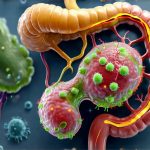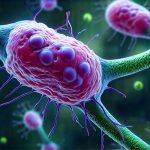The gut – often referred to as our ‘second brain’ – is far more than just a digestive system. It’s a complex ecosystem teeming with trillions of microorganisms, collectively known as the gut microbiota, that play a pivotal role in nearly every aspect of our health. From nutrient absorption and immune function to mental wellbeing and chronic disease prevention, the gut’s influence extends far beyond simply breaking down food. Increasingly, research highlights the profound connection between an imbalanced gut microbiome – often termed ‘dysbiosis’ – and a wide range of health issues, from digestive disorders like irritable bowel syndrome (IBS) and inflammatory bowel disease (IBD), to autoimmune conditions, allergies, anxiety, and even obesity. This has led many people to explore dietary interventions as a primary means of healing their gut, seeking natural alternatives to pharmaceutical approaches.
However, the question isn’t simply can you improve gut health through diet; it’s how comprehensively can diet address the underlying causes of gut dysfunction? While dietary changes are undeniably powerful and often the first line of defense in restoring gut balance, they aren’t always a standalone solution. The complexity of individual circumstances, lifestyle factors, and pre-existing conditions necessitates a nuanced understanding of both the potential and limitations of dietary approaches to gut healing. This article delves into the intricacies of this topic, exploring what can realistically be achieved through diet alone, and when additional interventions might be necessary for optimal gut health restoration.
The Power of Food as Medicine: Dietary Strategies for Gut Healing
The foundation of any gut-healing protocol rests upon intentional nutrition. It’s not merely about eliminating ‘bad’ foods; it’s about actively incorporating foods that nourish the microbiome and support overall digestive function. A cornerstone principle is reducing inflammatory triggers, often involving elimination diets tailored to individual sensitivities. Common culprits include processed foods, refined sugars, excessive alcohol, and certain food additives. However, a restrictive approach isn’t always sustainable or necessary. Instead, focusing on abundance – flooding the gut with nutrient-dense foods – can be more effective in the long run.
This involves prioritizing whole, unprocessed foods like fruits, vegetables, lean proteins, and healthy fats. Specifically, prebiotic foods play a crucial role. These are essentially food for your gut bacteria, encouraging their growth and diversity. Examples include garlic, onions, leeks, asparagus, bananas (slightly green are best), oats, and apples. Alongside prebiotics, probiotic-rich fermented foods like yogurt (with live cultures), kefir, sauerkraut, kimchi, and kombucha introduce beneficial bacteria directly into the gut ecosystem. It’s important to note that probiotic supplementation isn’t always superior to food-based sources, as the diversity of strains found in fermented foods is often greater.
Furthermore, fiber intake is paramount. Fiber not only feeds beneficial bacteria but also adds bulk to stool, promoting regularity and preventing constipation – a common contributor to gut imbalance. Aim for a variety of fiber sources, including soluble fiber (found in oats, beans, apples) and insoluble fiber (found in whole grains, vegetables). However, increasing fiber intake too quickly can sometimes exacerbate symptoms, particularly in individuals with IBS; therefore, gradual increases are recommended. Ultimately, dietary changes should be personalized based on individual tolerance and response. Considering diet diversity is essential for a thriving gut microbiome.
Beyond the Basics: Addressing Underlying Gut Issues
While a foundational diet focused on whole foods, prebiotics, probiotics, and fiber is essential for gut health, it may not address deeper underlying issues that contribute to dysbiosis. For instance, leaky gut syndrome, also known as increased intestinal permeability, occurs when the lining of the small intestine becomes damaged, allowing undigested food particles, toxins, and bacteria to enter the bloodstream. This can trigger systemic inflammation and immune responses. Dietary changes alone may not be enough to ‘heal’ a leaky gut; interventions like stress management, adequate sleep, and potentially specific supplements (like L-glutamine) might also be necessary.
Another common issue is Small Intestinal Bacterial Overgrowth (SIBO), where excessive bacteria reside in the small intestine, leading to fermentation of undigested carbohydrates and causing bloating, gas, and abdominal pain. Dietary approaches like a low-FODMAP diet can temporarily reduce bacterial feed, but addressing the root cause – often motility issues or structural abnormalities – is crucial for long-term resolution. This may involve prokinetic medications or other medical interventions alongside dietary modification. Similarly, enzyme deficiencies (like lactose intolerance or pancreatic insufficiency) can hinder proper digestion and contribute to gut imbalance; these require targeted supplementation rather than solely relying on dietary changes.
It’s critical to remember that the gut is interconnected with the rest of the body. Stress, sleep deprivation, chronic infections, and medications like antibiotics can all significantly impact the microbiome and digestive function. Therefore, a holistic approach that addresses these factors alongside diet is often necessary for achieving lasting gut health. If you struggle with persistent symptoms, it may be helpful to explore if gut sensitivities cause panic attacks.
Identifying Your Individual Needs: Personalized Approaches
One of the biggest pitfalls in gut healing is adopting a one-size-fits-all approach. What works wonders for one person may be detrimental to another. Individualized assessment is key, and this doesn’t necessarily require expensive testing. Start by carefully observing your body’s response to different foods. Food diaries can be incredibly helpful for identifying trigger foods or patterns related to symptoms.
Consider your overall lifestyle: stress levels, sleep quality, physical activity, and medication use all influence gut health. A detailed history of past illnesses, infections, and antibiotic usage is also important. While testing like stool analysis (to assess microbiome composition) or SIBO breath tests can provide valuable insights, they shouldn’t be seen as a substitute for careful self-observation and professional guidance.
Based on your individual needs, dietary adjustments should be tailored accordingly. For example:
– Someone with IBS might benefit from a low-FODMAP diet to reduce bloating and gas.
– An individual with histamine intolerance may need to avoid fermented foods and high-histamine foods.
– A person struggling with constipation might focus on increasing fiber intake and hydration.
The Role of Gut Repair Protocols & Supplements
The term “gut repair” often refers to strategies aimed at restoring the integrity of the intestinal lining and reducing inflammation. While diet is foundational, certain supplements can play a supportive role. L-glutamine, an amino acid, is believed to help repair damaged gut cells. Collagen, containing glycine and proline, may also support gut barrier function. Zinc carnosine has shown promise in promoting mucosal healing.
However, it’s crucial to approach supplementation cautiously and under the guidance of a healthcare professional. Supplements aren’t a quick fix and shouldn’t be used as a replacement for a healthy diet and lifestyle. Furthermore, some supplements can actually worsen gut symptoms in certain individuals; for example, excessive vitamin C can cause diarrhea in sensitive people.
Beyond specific supplements, consider incorporating bone broth into your diet – rich in collagen and amino acids, it’s traditionally been used to support gut health. Hydration is also critical, as adequate water intake aids digestion and promotes regularity. Remember that supplementation should be viewed as an adjunct to dietary changes, not a substitute for them. Understanding the link between gut pain and additives can help you make informed choices.
When To Seek Professional Guidance: Beyond DIY Gut Healing
While many people can significantly improve their gut health through diet alone, there are times when professional guidance is essential. If you’ve implemented consistent dietary changes and lifestyle modifications without experiencing significant improvement, it’s time to seek help from a qualified healthcare practitioner – ideally one specializing in functional medicine or gastroenterology with expertise in the microbiome.
Red flag symptoms that warrant professional attention include: severe abdominal pain, persistent diarrhea or constipation, unintended weight loss, bloody stools, anemia, and signs of systemic inflammation (like fatigue, joint pain, skin rashes). These could indicate underlying conditions like IBD, celiac disease, or infections that require medical diagnosis and treatment.
A healthcare professional can help identify the root cause of your gut issues, recommend appropriate testing, develop a personalized treatment plan, and monitor your progress. They can also provide guidance on safe and effective supplementation strategies. Ultimately, healing the gut is often a journey, and partnering with a knowledgeable practitioner can significantly increase your chances of success. Don’t hesitate to seek help if you’re struggling to navigate this complex process on your own. It might be time to consider healing gut inflammation through diet under professional guidance. Also, remember that in some cases, can cold weather trigger gut sensitivity? and understanding these factors is crucial for personalized care. Finally, explore whether can gut healing reverse food sensitivities for a long-term solution.


















